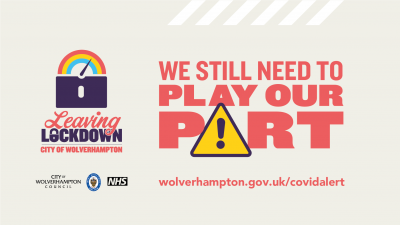That's because while the vaccine offers people much greater protection against Covid-19 were they to contract it, they could still become infected with the virus and pass it on to others.
For the same reason – and because 1 in 3 people with Covid-19 don't realise they have it because they don't display any symptoms – everyone who has had the vaccine should continue to have a regular rapid Covid-19 test to check that they haven’t got the virus.
John Denley, Wolverhampton's Director of Public Health, said: "The Covid-19 vaccine is the best protection we can get against this deadly virus.
“According to latest figures, well over 120,000 people in Wolverhampton have now had at least one jab, with more and more people going back for their second dose. This is particularly important as it acts as a booster, enhancing immunity and offering people stronger and longer lasting protection against infection.
“A study from Public Health England published today has also found that a single doses of the vaccine can cut transmission to others by up to half.
“So by getting your jab, you are not only doing it for yourself, but for your family and the wider community.
"However, while the vaccine both offers you protection and helps prevent you passing on the virus to others, it doesn't stop either of these entirely; you could still contract Covid-19 and you could still pass it onto a more vulnerable friend, family member or work colleague.
"That's why it is essential that, even after you've had the first or both doses of the vaccine, you should continue to follow the Hands, Face, Space and Fresh Air guidance by washing your hands regularly, wearing a face covering where required, practising social distance by staying two metres from people you don't live with and spending more time outdoors.
"And because there is a risk you could still be infectious if you were to contract Covid-19 without realising it, it’s also really important that you get a rapid test twice a week, to reassure yourself that you don't have the virus.”
For details of rapid testing for people without symptoms of Covid-19, please visit Coronavirus Testing. Anyone with symptoms of Covid-19, which include a fever, a new continuous cough or a change to the sense of taste or smell, must immediately self isolate and book a PCR test by visiting GOV.UK or calling 119.
Anyone who is either over 42 or who will turn 42 before 1 July can now arrange their vaccine appointment through the national booking website, Coronavirus (COVID-19) vaccine. The vaccine is also currently available to anyone who is clinically extremely vulnerable; people with a learning disability; frontline health and social care workers; and people who are in receipt of Carer's Allowance or are the main carer of an elderly or disabled person whose welfare may be at risk if their carer falls ill.
For more information about the vaccine, including the answers to frequently asked questions, please visit Covid-19 Vaccine or Coronavirus (COVID-19) vaccination.
The latest information and guidance around coronavirus is available at GOV.UK and on the council’s own coronavirus pages, which includes information in a wide range of languages and guidance around staying safe during Ramadan. Further details of the restrictions currently in place, and the answers to frequently asked questions, are available at COVID Alert.
